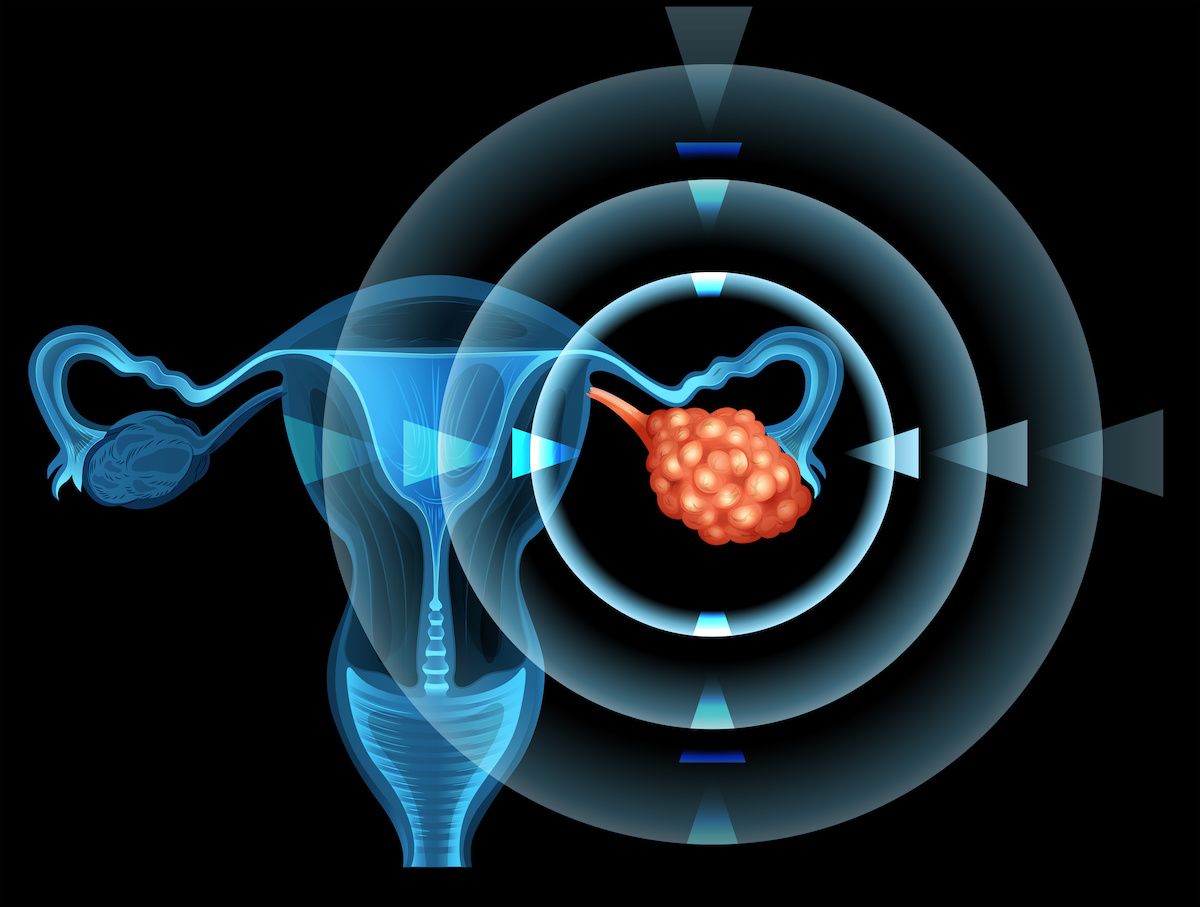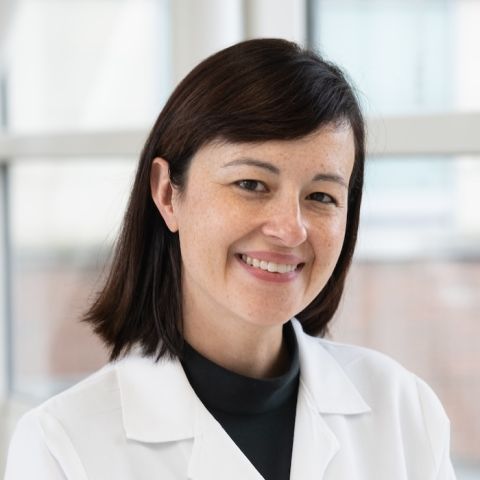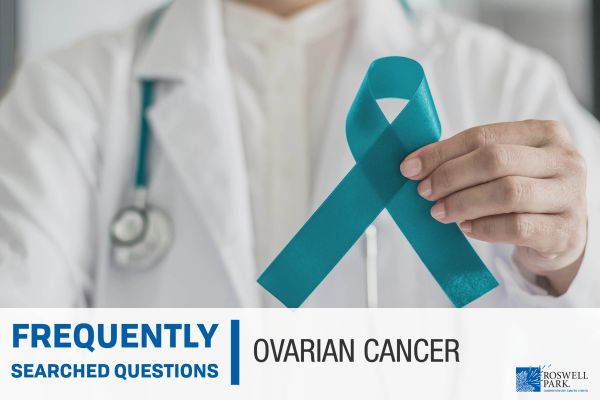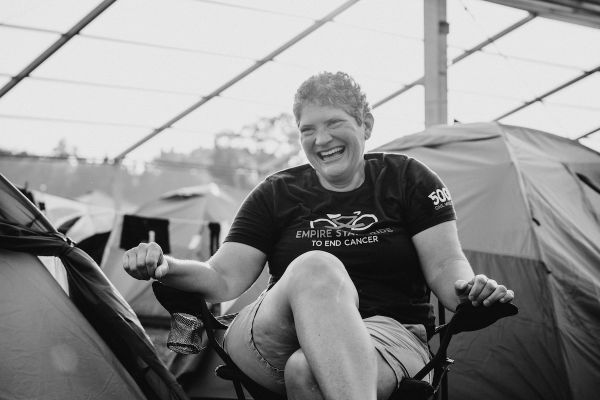New options for treating recurrence
Ovarian cancer is among the most aggressive and toughest of all gynecological cancers to diagnose and treat. The most common kind, called high-grade serous ovarian cancer, has about an 80% chance of returning.
“Typically, the first time someone has been diagnosed with a given cancer, like ovarian cancer, they receive an initial treatment regimen, usually chemotherapy or surgery or both, and hopefully will enter remission, meaning they are without any evidence of cancer,” explains Katherine Mager, MD, FACOG, a gynecologic oncologist at Roswell Park Comprehensive Cancer Center.
“If the cancer returns after initial treatment and remission, it is called recurrence. This means there were cancer cells remaining that regrew. In the setting of ovarian cancer, this means that the initial diagnosis was a cancer that started in the ovary, fallopian tubes or peritoneum and those same cells come back.”
Relapse after initial, or first-line, treatment typically happens in more than seven of 10 people. The time from initial therapies to recurrence can be from few months to more than five years, with a median interval of 18 to 24 months.
“Unfortunately, we still don’t have a good screening test for ovarian cancer, but in the setting of having a prior cancer, you will be monitored closely by doctor with physical exam, blood tests and imaging as needed,” Dr. Mager says.
Why does ovarian cancer tend to recur?
Whether your ovarian cancer returns, and how long it takes to return, is primarily determined by the type and stage at your first diagnosis. The earliest symptoms of the disease are hard to identify and often overlooked, so many ovarian cancer cases are diagnosed in later stages: high-grade serous ovarian cancer, for example, is usually diagnosed at a late stage.
Women diagnosed with Stage 1 ovarian cancer have a 20% chance of recurrence, while those diagnosed at Stage 3 or 4 increase the rate and time to recurrence to nearly 90%. Other factors, such as certain genetic mutations like BRCA mutations, are associated with longer remission and time to reoccurrence. Generally, if you responded well to first-line chemotherapy treatment, you have less chance for recurrence and greater chance for longer-term remission. Poor or no response to initial treatment can result in a recurrence, however, that is more likely to lead to a relapse.
“It’s important to know that when we talk about ovarian cancer, it’s really a grouping of cancers, including fallopian tube cancer, primary peritoneal cancer and ovarian cancer. All three of these fall under the umbrella of ovarian cancer,” says Dr. Mager.
“Within that umbrella, there are different subtypes with different risks of recurrence; some are more aggressive, and some are less aggressive. The specific type of ovarian cancer you have is important for determining your risk of recurrence.”
Symptoms of a recurrence of ovarian cancer include abdominal pain, bloating, nausea, or vomiting and changes in bowel or bladder habits. If you have any changes in your urinary, bladder or eating habits, or have a new pain, you should alert your doctor.
Can ovarian cancer return if my ovaries have been removed?
Ovarian cancer may recur when microscopic cancer cells remain in your body after the first-line treatment, and multiply and grow over time. Return in a little more than half of ovarian cancer cases occurs at the primary site of diagnoses – in the pelvis or abdomen. The remainder of relapse cases are identified in a wide variety of sites, such as the retroperitoneal nodes, liver, brain and bone.
“If someone’s ovaries are no longer present and the cancer was found somewhere else – the lung, for instance – this means that the abnormal cells that started in the ovary have traveled to another part of the body. But’s it’s still ovarian cancer, not lung cancer,” Dr. Mager explains. “If your doctor suspects a recurrence, they may order a CT or PET/CT scan and recommend a biopsy to evaluate the extent of disease return and determine if the cancer looks like ovarian cancer.”
Getting a second opinion
In the case of recurrent ovarian cancer, getting a second opinion from experts who treat this disease every day is incredibly important.
Learn moreHow is recurrent ovarian cancer treated?
If your ovarian cancer returns, the status of your disease, length of chemotherapy-free intervals and your overall health will play a major role in helping you and your doctor decide which treatments are best for you.
Options for treatment have progressed incredibly over the last couple of years, with a focus on:
- Immunotherapy that leverages your body’s own immune system to fight the cancer.
- Targeted therapies that address specific mutations within the cancer cells.
- Clinical trials that provide access to medication or an intervention deemed promising based on laboratory studies.
“Recurrent cancer should be viewed as a chronic disease that will require treatment throughout your life, with treatment goals tailored to what is important to you,” advises Dr. Mager. These goals may include prioritizing quality of life, pursuing more aggressive treatment or deciding not to pursue cancer-directed treatment.
“Especially in the setting of wanting to pursue cancer-directed treatment, it is important to hear all of your options. It’s extremely important to work with specialists who can help personalize a treatment plan.”
Typically, goals for treating recurring ovarian cancer focus on controlling the disease, limiting treatment-related toxicity improving or maintaining disease-related symptoms.
Why Roswell Park for recurrent ovarian cancer?
Roswell Park is a comprehensive cancer research and treatment center designated by the National Cancer Institute (NCI) and offers therapy for persistent, refractory and recurrent ovarian cancer. Your treatment plan will be developed with you in collaboration with our team of medical and surgical oncologists and pathologists who have expertise, experience and the most current knowledge of the latest therapies in their field.
“Here at Roswell Park, we are on the forefront of ovarian cancer treatment, and that involves incorporating newly approved therapies that have already gone through clinical trials and can now be used national and internationally. We have a large group of women with recurrent ovarian cancer that we treat, so we have a lot of familiarity with these treatments,” Dr. Mager says.
Typically, immunotherapy in ovarian cancer has had limited response rates of around 10 to 15%. However, a combination immunotherapy developed by Roswell Park has become one of the new treatment options for women with recurrent ovarian cancer.
“We ran an exciting clinical trial where we combined an available immunotherapy called pembrolizumab, or Keytruda, with two other types of medication that we were already standardly using for the treatment of ovarian cancer,” Dr. Mager explains. “It’s a regimen that is very well tolerated by patients and is successful in terms of response rates. We saw response rates in the vicinity of 40% which is really remarkable for immunotherapy in women with recurrent ovarian cancer.”
She is most excited now about research that is moving toward truly personalized and targeted therapies for recurrent ovarian cancer. “We’ve evolved so much in how we understand cancer, and know now that it’s not just where it started and what it looks like under the microscope. We have to think about the cancer’s genetic makeup, the patient’s genetic makeup, the patient’s immune system, and other factors that could be influencing the cancer.”
Novel therapies have increased incredibly over the last couple of years, so there is absolute hope today for women diagnosed with a recurrence of ovarian cancer reports Dr. Mager. “The options just continue to multiply,” she says.




